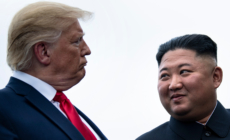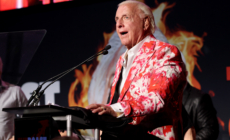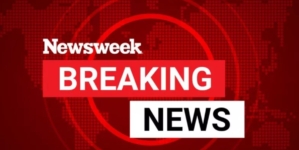-
Jaren Jackson Jr. Signs Mega Extension to Stay With Grizzlies - 5 mins ago
-
California Fire Evacuation Map Shows Where People Told to ‘Leave Now’ - 40 mins ago
-
Cancer Curtailed British Royal Family’s Public Engagements - 44 mins ago
-
Royal Tradition Ends After 156 Years—King Charles Ditches Royal Train for Helicopters - about 1 hour ago
-
Gaza City Cafe Hit by Deadly Strike - about 1 hour ago
-
Lakers, LeBron James Rumors Receive Huge Update - 2 hours ago
-
Teen Mt. Whitney hiker who walked off 120-foot cliff in delirium makes slow recovery, family says - 2 hours ago
-
Dangerous Heat Grips Much of Europe, With More to Come - 2 hours ago
-
North Korea Ignores Trump’s Overtures - 2 hours ago
-
Trump Vowed to Dismantle MS-13. His Deal With Bukele Threatens That Effort. - 3 hours ago
Russia ‘Offering No Concessions’ in Ukraine Peace Talks With Trump: ISW
Russia is “offering no concessions” in Ukraine peace talks with President Donald Trump despite Kyiv making offers, according to the Institute for the Study of War (ISW).
Newsweek reached out to the Ministry of Foreign Affairs of the Russian Federation for comment via email.

Mikhail Metzel/Associated Press
Why It Matters
Russia’s refusal to offer any concessions to Ukraine in peace negotiations despite the fact that it illegally invaded Ukraine in February 2022 suggests that it does not acknowledge that it initiated the war. Moscow’s lack of concessions could prolong the war and the peace talks, resulting in higher casualties and further damage to infrastructure on both sides.
As Russia’s diplomatic relations with the U.S. have been improving since peace talks began, the U.S. could support Moscow’s mission to cede nothing, which could undermine Ukraine’s territorial integrity and security.
What To Know
In its Russian Offensive Campaign assessment published on March 10, the ISW said: “Russia continues to publicly claim that it wants peace while offering no concessions of its own in sharp contrast with the concessions Ukraine has already offered.”
The Washington D.C.-based think tank noted that although Kyiv is expected to outline concessions at the upcoming peace talks with U.S. officials in Saudi Arabia, Moscow’s officials continue to reiterate Russian president Vladimir Putin’s demands for ending the war from 2021 and 2022, which show no signs of movement in Ukraine’s favor.
The ISW cited a magazine interview with Russian Foreign Minister Sergey Lavrov released by the Russian Ministry of Foreign Affairs’ on March 10, in which Lavrov said: “Russian President V.V. Putin has repeatedly said, we are always ready for negotiations. But at the same time, our national interests must be guaranteed. The root causes of the conflict in Ukraine must be eradicated,” echoing Putin’s repeated demands.
Lavrov said the eradication of the “root causes” of the war was in reference both to “the need to eliminate threats to Russia’s security from the Ukrainian and Western directions in general, which have arisen as a result of NATO expansion to the east,” and the allegation that Ukraine is “exterminating everything that is in one way or another connected with Russia and the Russian world.”
After his explosive meeting with Trump at the White House, Ukrainian president Volodymyr Zelensky proposed in a March 4 post on X, formerly known as Twitter: “The first stages [of ending the war] could be the release of prisoners and truce in the sky—ban on missiles, long-ranged drones, bombs on energy and other civilian infrastructure—and truce in the sea immediately, if Russia will do the same.”
The ISW also noted that Zelensky has previously indicated on numerous occasions that he is “willing to make concessions on territory, Ukraine’s NATO membership, and his own tenure in office in order to secure a just and sustainable peace.”
But on March 6, Putin emphasized that he would cede nothing to Ukraine in peace negotiations, as he spoke about his conditions for a peace agreement during a meeting with the Defenders of the Fatherland foundation. After one of the members of the foundation, a woman whose son died fighting in the war, said that Russia should not give in to anyone, the Russian president said “we don’t intend to do that.”
Lavrov also ruled out making any territorial concessions to Ukraine before the U.S. and Russia’s meeting in Saudi Arabia on February 17, saying: “Territorial concessions to what is now called Ukraine were made by the Soviet leadership during the formation of the USSR.”
Putin’s demands for the end of the war have included Ukraine giving up its NATO aspirations, and Moscow not making significant territorial concessions. Russia controls about 20 percent of Ukrainian territory and has pushed for Kyiv to cede control of the entirety of the Luhansk, Donetsk, Kherson and Zaporizhzhia regions.
Ukraine insists that, as a sovereign democratic nation, it should not have to concede territory gained by Russia during its illegal invasion.
What People Are Saying
According to the U.S. Department of State’s transcription of U.S. Secretary of State Marco Rubio’s remarks to the press, he said: “The most important thing that we have to leave here with is a strong sense that Ukraine is prepared to do difficult things, like the Russians are going to have to do difficult things to end this conflict or at least pause it in some way, shape or form.”
Rubio added: “I think both sides need to come to an understanding that there’s no military solution to this situation. The Russians can’t conquer all of Ukraine, and obviously it’ll be very difficult for Ukraine in any reasonable time period to sort of force the Russians back all the way to where they were in 2014.”
Michael MacKay, a pro-Ukraine X user, wrote on the platform: “They’re not peace talks. They’re capitulation demands given to Ukraine by the Russian Federation and its client state, the United States. It’s all maskirovka, designed to fail because invader Russia makes no concessions at all. The goal is to turn public opinion against Ukraine.”
In response to Vice President JD Vance’s post on X that “hope is not a strategy to bring peace to Ukraine,” Dan Shapiro, the former U.S. ambassador to Israel, wrote on X: “The Trump hope=strategy is hoping that making extensive concessions to Putin (territory, Zelensky’s job, no U.S. role in security guarantees, no NATO for Ukraine, distancing from NATO allies) will not whet Putin’s appetite for more conquest.”
What Happens Next
Russia has recently denied reports that it will be participating in peace talks with the U.S. in Saudi Arabia separate from Ukraine, and it is unclear when Moscow and Washington will meet next.
Source link




















